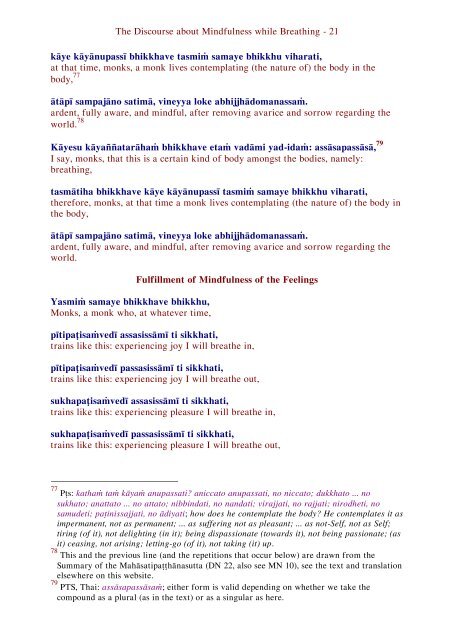Ānāpānasatisuttaṁ, The Discourse about Mindfulness while Breathing
A Pāli and English line by line (interlinear) version of this important discourse about the development of meditation while breathing (MN 118).
A Pāli and English line by line (interlinear) version of this important discourse about the development of meditation while breathing (MN 118).
You also want an ePaper? Increase the reach of your titles
YUMPU automatically turns print PDFs into web optimized ePapers that Google loves.
<strong>The</strong> <strong>Discourse</strong> <strong>about</strong> <strong>Mindfulness</strong> <strong>while</strong> <strong>Breathing</strong> - 21<br />
kāye kāyānupassī bhikkhave tasmiṁ samaye bhikkhu viharati,<br />
at that time, monks, a monk lives contemplating (the nature of) the body in the<br />
body, 77<br />
ātāpī sampajāno satimā, vineyya loke abhijjhādomanassaṁ.<br />
ardent, fully aware, and mindful, after removing avarice and sorrow regarding the<br />
world. 78<br />
Kāyesu kāyaññatarāhaṁ bhikkhave etaṁ vadāmi yad-idaṁ: assāsapassāsā, 79<br />
I say, monks, that this is a certain kind of body amongst the bodies, namely:<br />
breathing,<br />
tasmātiha bhikkhave kāye kāyānupassī tasmiṁ samaye bhikkhu viharati,<br />
therefore, monks, at that time a monk lives contemplating (the nature of) the body in<br />
the body,<br />
ātāpī sampajāno satimā, vineyya loke abhijjhādomanassaṁ.<br />
ardent, fully aware, and mindful, after removing avarice and sorrow regarding the<br />
world.<br />
Yasmiṁ samaye bhikkhave bhikkhu,<br />
Monks, a monk who, at whatever time,<br />
Fulfillment of <strong>Mindfulness</strong> of the Feelings<br />
pītipaṭisaṁvedī assasissāmī ti sikkhati,<br />
trains like this: experiencing joy I will breathe in,<br />
pītipaṭisaṁvedī passasissāmī ti sikkhati,<br />
trains like this: experiencing joy I will breathe out,<br />
sukhapaṭisaṁvedī assasissāmī ti sikkhati,<br />
trains like this: experiencing pleasure I will breathe in,<br />
sukhapaṭisaṁvedī passasissāmī ti sikkhati,<br />
trains like this: experiencing pleasure I will breathe out,<br />
77 Pṭs: kathaṁ taṁ kāyaṁ anupassati? aniccato anupassati, no niccato; dukkhato ... no<br />
sukhato; anattato ... no attato; nibbindati, no nandati; virajjati, no rajjati; nirodheti, no<br />
samudeti; paṭinissajjati, no ādiyati; how does he contemplate the body? He contemplates it as<br />
impermanent, not as permanent; ... as suffering not as pleasant; ... as not-Self, not as Self;<br />
tiring (of it), not delighting (in it); being dispassionate (towards it), not being passionate; (as<br />
it) ceasing, not arising; letting-go (of it), not taking (it) up.<br />
78 This and the previous line (and the repetitions that occur below) are drawn from the<br />
Summary of the Mahāsatipaṭṭhānasutta (DN 22, also see MN 10), see the text and translation<br />
elsewhere on this website.<br />
79 PTS, Thai: assāsapassāsaṁ; either form is valid depending on whether we take the<br />
compound as a plural (as in the text) or as a singular as here.


















